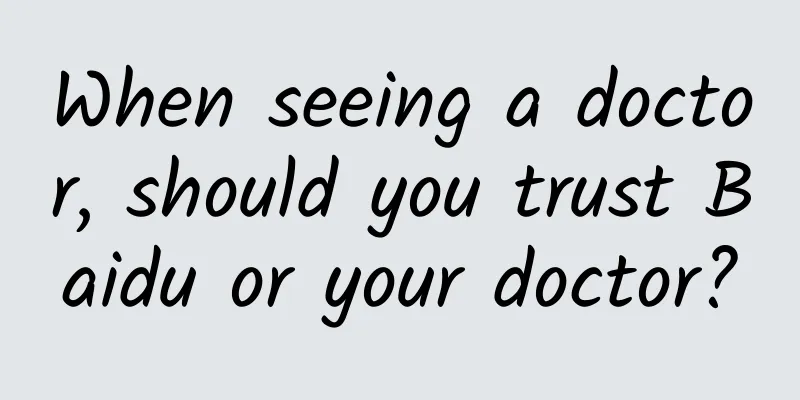When seeing a doctor, should you trust Baidu or your doctor?

|
In an era when Internet search is widely used, search engines have almost become an indispensable tool in people's daily lives. Many people who are used to surfing the Internet may have such a habit. When a part of the body is uncomfortable, the first reaction is to "Baidu" to see what the Internet says. Relying on the Internet for blind self-diagnosis, searching before seeing a doctor, and always thinking the worst of the disease, this "Baidu disease" in the Internet age is spreading. However, this kind of online self-diagnosis behavior is not only very likely to misdiagnose, but also brings problems to doctor-patient communication. "Baidu disease" makes doctors "very angry" Doctor Wang Jingjing recently had a dispute with a patient. The cause of this dispute was that a patient had symptoms of hematuria and the number of red blood cells in the urine exceeded the standard. Doctor Wang said to do a CT scan first to see the results. The patient insisted that he was very likely to have bladder cancer and needed a cystoscopy, because "I checked on Baidu and the symptoms are exactly the same as mine." The patient also stressed: "You are a young doctor and you probably don't understand it." "I was so angry at the time. Is it my professionalism as a doctor or your 'someone on the Internet' who came out of nowhere? No matter how young I am, I have been in medical school for so many years." Wang Jingjing was still very depressed when she recalled this incident. She told the Science and Technology Daily reporter that the final result was that the patient's condition was caused by kidney stones. She said that now patients like to go online to see what disease they have, and when they come to see a doctor, they directly ask the doctor to make a diagnosis and prescribe medicine. "If you meet an experienced doctor, you can still control it a little. For a young person like me, patients don't believe anything you say." The problem Wang Jingjing encountered is not an isolated case. Zhang Kai, a pediatrician at a children's hospital in Hunan, exaggeratedly said in an interview with the Science and Technology Daily reporter: "The most depressed thing is that those of us who work in pediatrics have been forced to stop working." Because parents are very nervous about their children, they are always worried that their children have some serious diseases mentioned on the Internet. Once the doctor denies it, there are often verbal abuse and even physical conflicts. "Even if you persuade him to trust you temporarily after a long time, after an hour, if the child is still not cured, the parents will come to the door again and say that we are quacks who harm people. God and God, what medicine can make your child heal in an hour!" Zhang Kai said helplessly. On Weibo, doctors often complain that their daily work is to fight with "professionals" who appear from Baidu. Zhang Kai said that many patients feel that they know their own conditions well after searching for them on Baidu, and ask the doctor to treat them in this way, and ask to use or not use certain medicines, which are mostly unreliable. "To be honest, we actually have an instinctive aversion to such situations. What we have learned for many years is not something you can search for in one minute on Baidu." Communication is the key, and reality has limitations In fact, "Baidu disease" is not unique to China. In the United States, such online self-diagnosis is named "Google disease". Some American media reported that more and more healthy people in the United States search for various symptoms on the Google search engine because they are worried that they will suffer from serious illnesses. The report mentioned that whenever a doctor sees a patient with swollen lymph nodes in the neck, the first reaction is that this is caused by a virus or streptococcal infection. But "if you search for 'swollen lymph nodes in the neck' on the Internet, there are also websites that introduce you to lymphoma and leukemia in the search results." However, the doctor-patient relationship problems caused by online self-diagnosis in the United States are not as obvious as in China. Wang Yu, a Chinese working in the United States, believes that the difference in the degree of communication may be caused by the different medical systems. As a Chinese student studying in the United States and staying in the United States to work, he has experienced the difference between the two. He told the Science and Technology Daily reporter that the first step for physical discomfort there is to communicate with the family doctor, sometimes by phone, sometimes in person. Basically, the family doctor has a certain understanding of your family situation and physical condition. You don't need to say much, just tell him where you feel uncomfortable this time, and he can give you a preliminary examination and diagnosis. The whole communication between doctors and patients is generally relaxed and pleasant. Doctors do not object to patients searching the Internet based on their symptoms. On the contrary, doctors will think that your willingness to popularize science and learn is worthy of recognition. He said that a small number of doctors will set up a computer in their own clinics in order to communicate more smoothly with patients-for searching with patients, and then analyzing the search results. Talking about this situation, Zhang Kai said that it is basically impossible to achieve this step with the current medical resources in my country. He said: "I sat there in the clinic all morning, from 8 to 11:30, hundreds of patients were waiting for me to see them, and each person only had a few minutes. Everyone was very anxious. I was here chatting with you online, what should the people behind me do?" Patients were helpless after being sent away by doctors after two minutes Compared with doctors' aversion to "Baidu for medical treatment", patients have different views. "I feel a little uncomfortable now, so I like to search online. The Internet provides too many conveniences. It is not easy to see a doctor now. If you really want to find a reliable and good doctor, you have to go to a big hospital. It's too much effort to see a doctor in a big hospital! It takes 2 hours to queue up and finally see a doctor. The total consultation time is 2 minutes. You ask him questions. If you meet a patient doctor, he will answer you, but some doctors are too lazy to answer." Xiao Zhang, who works in Beijing, told reporters. When the reporter interviewed him, he was receiving an IV drip in a community hospital in Huilongguan because of a severe cold. He told reporters that his strategy when he was sick was to search for his symptoms on Baidu, and then go to the community hospital to get some medicine when he had a clear idea. "The doctors in the community hospital are not much different from me, so they can just help prescribe medicine." Xiao Zhang said. Be cautious when self-diagnosing on the Internet It is worth mentioning that whether it is "Baidu disease" or "Google disease", self-diagnosis on the Internet should be very cautious. In foreign countries, Wikipedia is a trusted source of information for many people, and people can get a lot of useful and interesting knowledge from it. However, a study recently published in the Journal of the American Orthopaedic Association shows that even Wikipedia, which seems to be much more reliable than some websites, still has many problems in the medical information obtained from it. In China, the most terrifying thing about self-diagnosis on Baidu is not the unprofessional "second-rate" answers searched out, but the advertisements that are difficult to distinguish between true and false and take advantage of patients' trust in online searches. The popularity of "seeing a doctor on the Internet" has attracted many unscrupulous vendors to join in, resulting in a mixed quality of online information. The reporter found that if you use the name of the disease plus "how to treat" as a keyword to search on Baidu, many hospital website links will pop up, especially some specialized hospitals. Some large online communities and health websites have related sections where netizens can discuss their medical conditions online according to their needs. There are also many netizens who claim to be "doctors" who provide free online consultation on medical conditions. There are large interest chains behind these, so we need to be extremely cautious. (The two doctors in this article are pseudonyms at their request) As a winner of Toutiao's Qingyun Plan and Baijiahao's Bai+ Plan, the 2019 Baidu Digital Author of the Year, the Baijiahao's Most Popular Author in the Technology Field, the 2019 Sogou Technology and Culture Author, and the 2021 Baijiahao Quarterly Influential Creator, he has won many awards, including the 2013 Sohu Best Industry Media Person, the 2015 China New Media Entrepreneurship Competition Beijing Third Place, the 2015 Guangmang Experience Award, the 2015 China New Media Entrepreneurship Competition Finals Third Place, and the 2018 Baidu Dynamic Annual Powerful Celebrity. |
<<: Is there still any fun to play with Android without its “personal customization”?
>>: Prosecutors reveal the "four crimes" of Alipay fraud
Recommend
Scoping in Android and Hilt
Scoping object A to object B means that object B ...
Fun Box Game Set-Top Box First Test
At present, homogeneity is the biggest stumbling b...
How to build a private domain traffic system?
To read this article, you need to read the follow...
1080P becomes the golden resolution for mobile phones and is supported by half of foreign users
Nowadays, 4K screens are no longer exclusive to l...
The most miserable death of an animal: escaping from its natural enemies but being killed by itself?
On Earth, basically every animal has natural enem...
How to operate a community from 0 to 1? Here are my 7 thoughts
Next, I will talk about building a community from...
Advertising strategies for the Internet automobile industry (Part 3)
Whether it is a user product or a commercial prod...
The magic weapon for subway advertisements to flood the screen!
As the leader in outdoor advertising, subway adve...
What are those random things you see during a migraine?
Leviathan Press: When I was a kid, I would always...
In the future, we will go to the surface of Venus to collect samples! The fusion of science fiction and technology will create a different kind of excitement
Imagine a day in the future. Astronauts wearing c...
2016 is the most difficult year for the industry, but the color TV market still has opportunities to break through
“2016 may be the most difficult year.” At the &qu...
Get started with information flow advertising!
For more basic knowledge about information flow a...
How much does it cost to customize a driving school mini program in Bayannur?
In order to better penetrate into various industr...
Hong Kong regulates disposable tableware, and biodegradable plastics cannot escape being "banned". Why?
Every year, countless waste plastics drift into t...
Youku Tudou's latest equity exposure: Alibaba becomes the single largest shareholder
In recent times, Youku Tudou has been caught up i...









